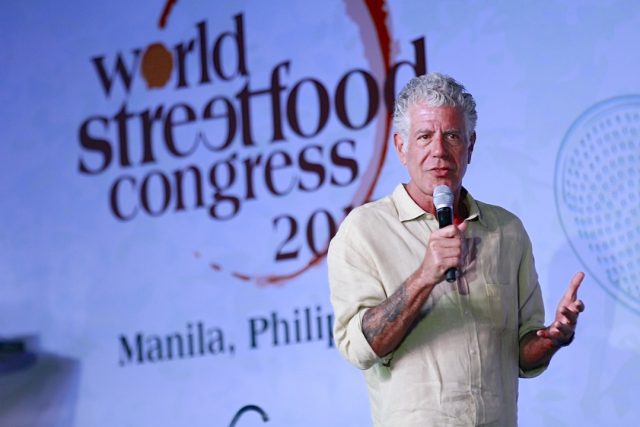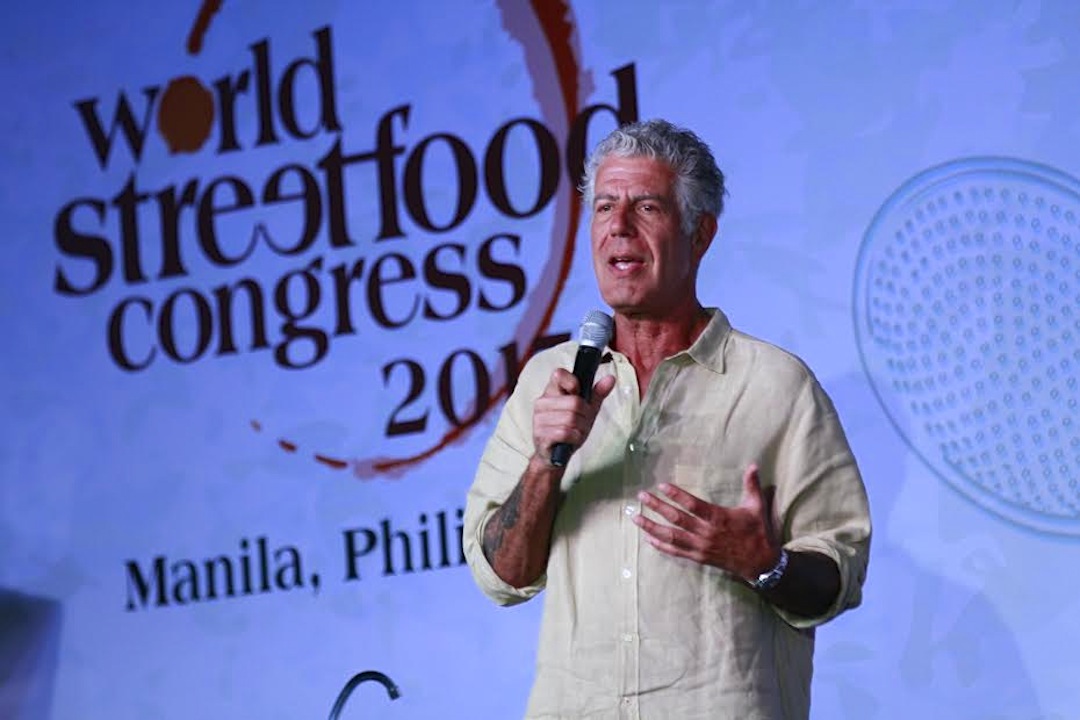
The second day of the ongoing Jamboree at the World Street Food Congress (WSFC) concluded with palpable excitement as food and travel celebrity Anthony Bourdain made an appearance, stopping at each stall, and having a short chat with star-struck chefs and stall owners.
Going from one stall to the next became a hurdle as Bourdain, with WSFC founder KF Seetoh, surrounded by over 10 members of the security team, was welcomed by fans who were all trying to get a photo or autograph of the celebrity chef.

Stopping by at the Philippine stalls, he got to enjoy a serving of la paz batchoy (noodle soup with pork liver, beef loin, pork cracklings, and egg) prepared by Iloilo’s Chef Rafael jardeleza; sisig paella of Pampanga’s Chef Sau Del Rosario; as well as isaw (grilled pork or chicken intestines) prepared by Chef JP Anglo of Sarsa, who is serving Bacolod fare at the Jamboree.

Apart from the food tastings, Bourdain concluded the two-day Dialogue at the congress with a talk on the importance of street food and its preservation; as well as his some of his plans on the upcoming Bourdain Market in New York.
“Street food in particular is important. First of all, it is a practical matter.The number one determining factor for an American tourist to decide on where are they going to spend their tourism dollar, one answer is the food. That’s often, if not predominantly, the driving influence,” he said before an audience that was eagerly listening to him.
While underscoring its importance, Bourdain also lamented the fact that “street food is under threat,” citing that it is oftentimes viewed as unsanitary and hazardous.
“They least understood that street food, and these heritage street vendor—multi-generational operations of people—are doing more or less the same thing very, very well over time. These are businesses worth saving, and that this is something we can treasure and preserve,” he said, mentioning how Singapore was able to successfully maintain its street food culture
“Let’s find a way to save it,” he added.

The food celebrity is said to open Bourdain Market in 2019. According to its website, the market is “assembling a dream list of chefs, operators, street food, and hawker legends from around the world with the hope of bringing them together in one New York City space.”
“This is not some Disneyland version…We’re talking about the widest collection of the real deal,” Bourdain noted.
When WSFC founder K.F. Seetoh asked if lechon is included on the list, Bourdain responded, “Yeah, got to have lechon.”
Meanwhile, here are some quotes by Bourdain—from food as politics to his fitness secret during his well-received talk at WSFC 2017:
1. Food is political, and a reflection of who we are.
“There is nothing more political than food. Food is a reflection, maybe the most direct and obvious reflection of who we are, where we come from, what we love, who eats in the country, who does. The things that we eat are the direct reflection of our histories.The ingredients, whether they are dried or pickled or preserved, these are reflections of often long, very painful histories. That’s how we got to these dishes.”
“I often say wealthy cultures that are lucky and fortunate and prosperous generally don’t cook very well because they never had to. It’s the cultures that has to struggle and make the most of what little they have who, have over time, learned to make wonderful things.”
2. Cooking as transformation.
“Cooking is about transformation—taking what we have however little that may be whether its a pig tail or a pig foot..and do something out of a humble ingredient like that.”
3. Food as a ‘storyteller’
“Food is something I’m passionate about, and food is something every culture claims to be. It is a reflection of who we are so someone is telling you a story when they cook for you. When you allow them to cook for you, when you sit down without judgment or preconception, they’re telling you, this is where I come from, this recipe is a reflection of maybe what my parents taught me, my grandparents, the reflection of my region, my language, my culture, my history. This is who I am that I would like to share with you. This is why street food is so so vibrant.
4. Eating food like a child.
“I hang out with a lot of the greatest chefs in the world. Chefs of 3-Michelin star restaurants are very good friends of mine … What chefs crave after work is a simple, good thing—whether it’s a bowl of pasta, a bowl of pho in the street, or a banh mi, some lechon—something that you can eat with your hands, and experience emotionally, not technically.
“I want to experience food emotionally, like a child. I want to be lost in the moment. I want to take a bite of food that takes me to another time or in another place, whether it’s my childhood or somebody else’s childhood. Anybody’s grandma’s food is preferable in my mind than a fine dining restaurant in almost every case.”

5. It’s not all about techniques.
“The great chefs understand that whatever skills they have learned, whatever sophisticated techniques, however precise the knife work, however many cooks, however expensive the food; at the end of the day, you are looking to evoke a child-like response, a familiarity, that feeling of being fed something you grew up with that brings you back into a special place in your own past.”
6. His secret to staying fit.
“When you see me on TV eating, I eat everything. I’m not taking a little bite and moving on. I eat strategically. If I know I’m going on a ten-course Imperial Chinese meal, you know I’m not having Eggs Benedict at the hotel. Also, I practice Brazilian Jiu Jitsu almost every morning that I can. I go to a very hot gym, and I work very, very hard to not let somebody half of my age—in a much better shape—try to choke me unconscious, and that’s very helpful in staying in shape. This martial arts thing has been very good for me.”









